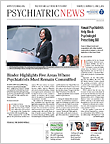Most people are familiar with the risks associated with underage drinking—alcohol can alter brain development, impair judgment, and increase risks of accidents and even death—and the ongoing efforts to curb use in this group.
In contrast, steps to prevent and treat older people who misuse alcohol are often not taken, despite the fact that misuse in this population can have equally dire consequences, according to Shilpa Srinivasan, M.D., an associate professor of neuropsychiatry and behavioral science at the University of South Carolina School of Medicine. Srinivasan chaired a session on this topic at the annual meeting of the American Academy of Geriatric Psychiatry in March.
“We really wanted to call attention to the fact that the occurrence of alcohol misuse in older adults doesn’t stop once an individual turns 65 or crosses the threshold into the geriatric age range,” Srinivasan said during an interview with Psychiatric News.
According to the 2013 National Survey on Drug Use and Health (NSDUH), 2.1 percent of people aged 65 and older engaged in past-month heavy drinking (defined as having five or more drinks per day in at least five days) and 9.1 percent engaged in past-month binge drinking (five or more drinks in at least one day).
“We know that heavy drinking is not as prevalent as it is in people aged 18 to 25, yet it is still present,” said Rebecca Payne, M.D., an assistant professor of clinical neuropsychiatry and behavioral science at University of South Carolina School of Medicine. Yet, high alcohol consumption by older adults can have a more negative impact in this population, Payne said. (The National Institute on Alcohol Abuse and Alcoholism considers seven drinks to be the maximum amount for people aged 65 and older in a given week. Drinking beyond this amount puts this population at risk of serious alcohol problems.)
“Older adults are more likely to have medical comorbidities and take medications for those comorbidities,” Payne told Psychiatric News. Combining alcohol with such medications can lead to adverse effects, including an increased risk for falls and potential worsening of any present cognitive impairment.
The first step to treating alcohol use disorder or heavy drinking in older adults is to use screening tools, such as the Michigan Alcohol Screening Test-Geriatric Version (MAST-G) and its shorter version (SMAST-G). Other screening tools are the Alcohol Use Disorders Identification Test and the CAGE Questionnaire.
“Because patient visits are short in duration in some clinical settings, asking [patients] about drinking can fall by the wayside,” Srinivasan said. “These scales can be easily and quickly used in busy clinical practices to identify people who are drinking excessively.”
If older patients are found to consume alcohol at unhealthy or risky levels, Srinivasan advises clinicians to be prepared to have a conversation with the patient about the consequences of drinking and possible treatment options, which may include psychotherapy, pharmacotherapy, or a combination of both.
There are currently three medications approved by the Food and Drug Administration for alcohol use disorder: naltrexone, acamprosate, and disulfiram. While none of these medications is known to have contraindications that are specific for older adults, she did note disulfiram use does carry an increased risk of tachycardia.
Both Payne and Srinivasan cautioned physicians to be mindful of possible interactions of any of the three pharmacotherapies intended for alcohol use disorder with other medications used to treat comorbid conditions. ■
“Alcohol Use Disorders in Older Adults,” the American Geriatric Society’s practice guideline for screening older patients for alcohol use disorders, can be accessed
here.

